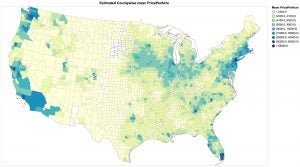An innovative new platform is changing the face of farmland data, pricing, and evaluation. CIBO is a data-rich software on an accessible format for a wide variety of farmers, buyers, sellers, lenders, and operators to obtain detailed land management information. In fact, the wide array of data CIBO offers has never been available before, the company says, and they hope to make the system of sharing agricultural land information as transparent as possible for easy access to accurately farm, buy, sell, lease, and practice sustainable land management.
In the aftermath of the highly publicized Tillable scandal earlier this year, data-centric ag companies and data-sharing have become increasingly side-eyed by the ag community. That situation involved the partnership Tillable made with The Climate Corporation over Climate’s popular FieldView platform, as there were suspicions surrounding the sharing of data and the lack of permissions to reveal such information. Tillable sent farmers and landowners letters offering to lease their land at rates — not only did this raise alarm bells about data-security, it also felt to many like an awkward interference to the numerous private and personal relationships with landowners and farmers.
Unlike data collection and sharing companies, CIBO compiles free and pre-purchased public information and runs it through advanced simulations, models, logarithms, and computer vision to create simplified evaluations, similar to real estate estimates you’d find on Zillow.
“CIBO is not a land sale or leasing site, but rather a Land Intelligence Platform that enables all users to evaluate and compare land with objective information,” said Dan Ryan, the company’s CEO. “These insights include valuation, lease value, productivity, stability, environmental impact, and historic practices and yield, and in-season yield forecasts.”

CIBO was developed by Dr. Bruno Basso of Michigan State University’s Department of Earth and Environmental Sciences and has grown nationwide with offices in Minneapolis, St. Louis, and Boston. To begin building an accurate database, a fifth-generation Kyle Mehmen, Iowa farmer, was an early collaborator with the company in development by using his fields. Now the staff at CIBO regularly collaborates with a host of farmers, and the company has a partnership with the Family Farms Group.
The data CIBO offers enables users to access science-based, objective information about farmland they’re interested in from the national scale all the way down to the parcel level. Impressively, the platform doesn’t involve any user input, farm, or landowner information. The press release announcing CIBO said that the system “amasses vast amounts of public and private data” and uses proprietary simulation models with artificial intelligence and machine learning.
Ryan, however, said the reference to private data needed to be clarified because CIBO doesn’t use private information, per se, but rather that some of the databases CIBO utilizes require a fee for users and thus have somewhat limited access.
CIBO pulls its public information from the USDA and other government agency databases and will then use crop simulation, computer vision, and data science to interpret that information. This technology and the computer modeling used to improve the system is described as a machine understanding “how a plant grows.” It takes the data for things like weather, rainfall, sunlight, soil type, and climate — coupled with satellite imagery from over the years — to create a virtual ecosystem and make an evaluation of the parcel on that information. This is something that has never been done before on this sort of scale, Ryan said.
“The richest data we have is in the Corn Belt where we have corn, soybeans, and cotton,” Ryan said of the system. “For example, in California we’re not going to have a lot of information around yield or productivity, and that’s because we don’t have computer models for tomatoes or lettuce, but we do have them for soybean and cotton.”
With this, users can get a fair price for every single parcel of farmland in the continental U.S. as well as ratings on details such as reliability, sustainability, weather, soil and elevation. CIBO makes it easy crunching all the complicated data and numbers into easy to read scores making it easy to compare and contrast plots. Land can be searched freely on the website, and extra insights can be obtained through a small monthly fee.
Within its first three weeks, CIBO has already surpassed expectations of user engagement.
“Our users appreciate the rich data that we make available, the powerful search capabilities, and the modern, high-performing application that can be accessed by web, mobile web, or native mobile applications,” Ryan said. “We enable them to easily evaluate unfamiliar land, whether for looking at new land to operate or buy, providing loans or insurance, or selling inputs and other products.”
Additionally, CIBO gives a sustainability standpoint perspective helping users understand the environmental impact of farming on specific plots of land.
Jaclyn Krymowski is a graduate of The Ohio State University with a major in animal industries and minor in agriculture communications. She is an enthusiastic agvocate, professional freelance writer, and blogs at the-herdbook.com.



